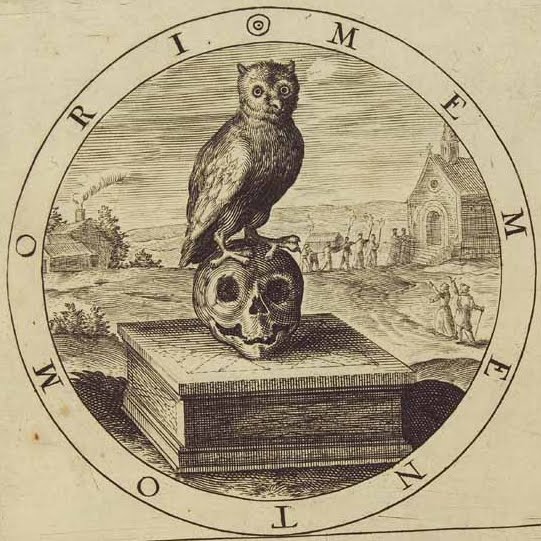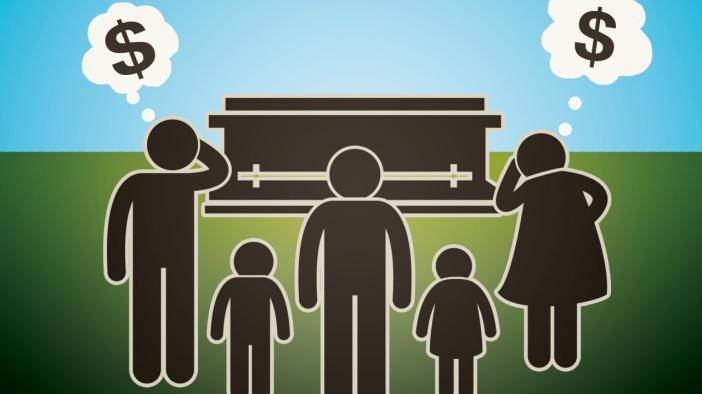Sorry for all the death stuff, dear readers. I hope I’m not bringing you down. Still, it’s something we all must deal with, for in the end, we all come to dust.
My grandma told me that when she was a kid in Appalachia, “funerarials,” as she called them, lasted three days. On the first day, the living sat in overnight vigil at home with the deceased. On the second day, the deceased was embalmed, and on the third was the burial followed by a memorial feast. I always thought that sounded nice, minus the embalming part. I’ve always loved the idea of wakes. I used to say I didn’t want any kind of funeral for myself, because I felt like I wouldn’t need it (being dead) and I didn’t want to put the burden of the cost and organizing all the details on my bereaved loved ones (though I can only assume there would be throngs and throngs of them).
My mom says she doesn’t want any funeral or memorial service, and in one sense that’s a relief because I rather doubt I would be capable of organizing such a thing. Plus almost all her friends are dead already. But as I think about it, it makes me really sad that a good person who lived an interesting life should be sent away without a celebration of that life. I am not exaggerating when I tell you that the rest of the family cannot wait for my mom to die. It’s not because my mom was a difficult or cruel or obnoxious person, nor is it because they want to get their hands on a big inheritance. No, it’s for one simple reason: she’s inconvenient. They don’t want to be bothered with her. And they aren’t. I do everything that needs doing, I pay for everything that needs paying. They live in the same city and they cannot even be bothered to call my mom, let alone come visit her.
This is an injustice to my mom and to me. Do I even need to say that these people have some serious *issues* when it comes to death? That’s what it really comes down to. Seeing my mom, even thinking about her, is inconvenient because it would force them to face up to not only mortality itself but all the gross bodily deterioration, loneliness, and fear that leads up to it.
Unfortunately if our family has a legacy it is The Grudge. Very small offenses can get you blacklisted for life. There are two parts of my family–each descended from one of my mom’s sisters–that haven’t spoken to each other or even so much as exchanged Christmas cards for decades. While her sisters were alive, my mom managed to be a bridge between them, but after my aunts died and my mom got sick, the family fissioned. Although my relatives can be surprisingly generous at times (mostly with stuff you don’t need), suffice to say if you stumble along the road they don’t stop to lend a hand. I’ve survived this long because I stay innocuous and don’t get sick much.
My ancestors and I have a lot to talk about.
So anyway, I found out about The Order of the Good Death via Blood & Coffee and it’s a great concept. (Check out the blog, there are some very interesting articles there.) Modern Western society has a seriously messed up relationship to death, which is to say, really no relationship at all. I was struck by this post by Anne Crossey: Whereas she and I agree that many societal ills can be laid at the doorstep of what she calls “death-denying ideologies,” she attributes them to deluded belief in a nonexistent afterlife, while I think it’s the fear that there is no afterlife that leads to death-denial. After about 200 centuries of increasingly reductionist, scientistic, atheist materialism, I think most people alive today have thoroughly absorbed the idea that there is no afterlife. They may be struggling with it, they may have faith in spite of their fears, but the people of magic know the cognitive dissonance that comes with the fight to keep hold of knowledge–even empirical, directly-experienced knowledge–while being constantly bombarded and mocked by contrary messages. I wouldn’t say that an unchallenged, hegemonic belief in an afterlife would remove all death’s fear or grief, but it is quite clear to me that our death-denial derives from our materialism, and not vice versa. Regardless of whether or how you conceive of an afterlife, dying, that most liminal of places, is inevitably and immanently numinous. But if your worldview cannot admit the numinous, then death is just rot and failure and the end of our dearest illusions, Forward Progress and Productivity and Ever Greater Acquisition. Not something your average American can handle. I think every person who waits in line for the latest iToy should have to spend at least a month in corpse meditation and hospice work.
Moving on. (No pun intended.)
I know my mom wants to be cremated, but I would prefer to biodegrade if possible, so I clicked on the OGD’s natural burial link. There I noticed (as I have elsewhere since I started researching this stuff) that cemeteries, the Neptune Society, basically any organization that deals with dead bodies, seem very loath to talk prices. I suppose this is viewed as crass, but I’ve also observed that any product or service where they don’t tell you the price up front is going to be more than you can afford.
And so it is with death.
And it pisses me off.
It’s a good thing my mom wants to be cremated, because I can’t afford anything else. My mom isn’t leaving behind any estate, any estate she did have would be taken by Medicare as reimbursement anyway. I have no problem with morticians or other death professionals (deathfessionals?) being recompensed for their time, effort, skill, and expertise, except in the larger sense that I am not a fan of capitalist exchange dynamics and the monetization of human relationships. Unfortunately, we live in a society where you gotta make money to live, and deathfessionals deserve to live too. I suspect–call me crazy here, but I suspect–that deathfessionals don’t get into that biz full of champagne wishes and caviar dreams. But as I think about some of the efficient, green, time-honored ways to facilitate a body’s decomposition, or touching stories about honoring the dead and faring-them-well, I realize that I and countless other Americans can’t afford any of these things. In the US, a cemetery plot is real estate, and priced accordingly. A coffin can cost you as much as a downpayment on a house. According to the New York Times, the average cost of an American funeral is $6,000. That article I linked makes it sound like it’s super cheap to bury someone at home, but think about it–Are you going to be able to dig the burial yourself, or will you need to hire help? Will you need legal advice on how to obtain the necessary permits? Are you going to have to refrigerate the body while you get the permits and dig the hole, and do you have the facilities (or, e.g., dry ice)? Do you own rural or semi-rural land on which to bury your loved one?
And don’t lets forget that the State and the “funeral industry” have to get their grubby paws in on the matter:
“Recently [this article was written in 2009], some states, with the backing of the funeral industry, have considered restricting the practice of home funerals. Oregon legislators last month passed a bill that would require death midwives to be licensed, something no state currently does.”
(I have learned through my experience with herbalism that we must be very, very grateful for those few vocations that don’t require licensure and regulation.)
At the beginning of this post I apologized for talking so much about death. But you know, it’s something we could all stand to talk about a little more. As I’ve worked through the process of stewarding my mom into death, I realize that not only do I need to talk much more with her about what a good death means to her, but I also need to talk to my friends–my family of choice and, for all the reasons I mentioned above, the only family I could hope to depend on to send me off well–about my own good death. Let’s not end up as hungry ghosts. Let’s all have the good deaths we deserve.







